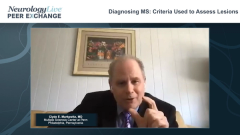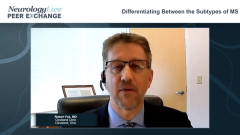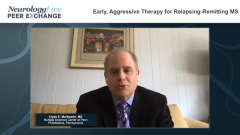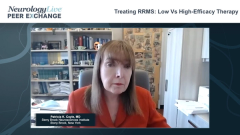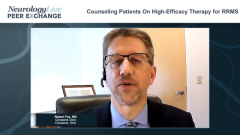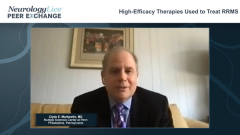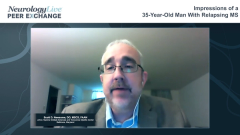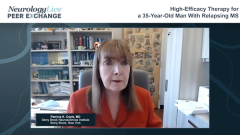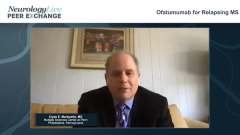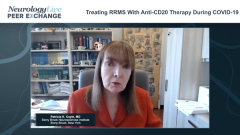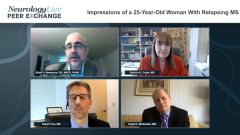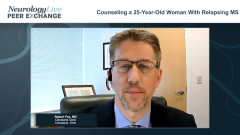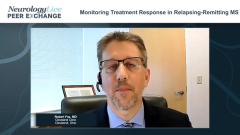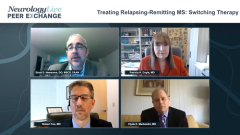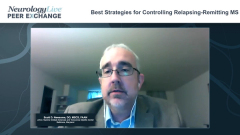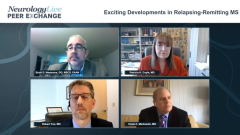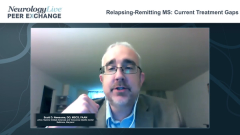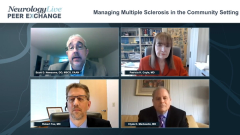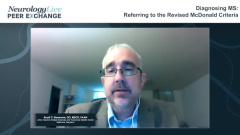
Best Strategies for Controlling Relapsing-Remitting MS
Drs Patricia K. Coyle and Robert Fox comment on approaching multiple sclerosis relapses as early as possible with high-efficacy therapy.
Episodes in this series

Scott D. Newsome, DO, MSCS, FAAN: Pat, what about you? I have read a couple of your papers, and one sticks out in my mind where you nicely laid out what the definition is for a subtherapeutic response. I know a lot of this is from consensus, guidance, and guidelines, but what are some of the things that maybe the rest of us have not mentioned that you take into consideration?
Patricia K. Coyle, MD: The AAN [American Academy of Neurology] 2018 practice guidelines had a good statement about unacceptable breakthrough activity, and that was a year on treatment. They tried to exclude that most of the DMTs [disease-modifying therapies] are going to take about 2 and a half months to be operational. If the patient had 1 or more clinical attacks, or had developed disability on the examination, or had 2 or more lesions, then that should trigger a switch discussion. That is a good idea. They drew the line, saying that 1 new lesion is not sufficient, and of course we do not know when that occurs. A new lesion on the new baseline imaging would probably have me repeat a brain MRI scan 6 months from then, rather than to let it go the full year. Those are pretty good guiding principles to follow.
This is the advantage of having multiple options. We try to optimize the first disease-modifying therapy choice, of course, but we then follow the patient closely and make sure that we have good communication. If it turns out that was maybe not the best treatment for them, and we talked about breakthrough activity. We heard Clyde talk about other issues such as poor quality of life, unacceptable adverse effects, needle fatigue, pregnancy concerns, change in the risk/benefit ratio, which is particularly pertinent to PML [progressive multifocal leukoencephalopathy], and an unacceptable laboratory abnormality that is not going away. That would have to be unacceptable. These are reasons to switch, and we have multiple options. That is the good news. We probably want to do stuff early. It seems to be early after the disease has announced itself. For the next few years, that sets the course for late disability. That is an important window of opportunity to pay attention to in our therapeutic approach to MS [multiple sclerosis].
Scott D. Newsome, DO, MSCS, FAAN: I like that window of opportunity quote because I feel that, in relapsing onset MS, that window is probably within the first couple years, maybe 5 years. We could argue back and forth what that window is, but there is clear evidence way back in the CIS [clinically isolated syndrome] trials that those who started treatment early did much better long term. Even when those who were on placebo started the active treatment, they never caught up. There are studies that have shown that again and again even as of recent days, so it is important.
Patricia K. Coyle, MD: There was that interesting big MS database study in which treatment in the first 6 months was the only treatment that significantly lessened late disability, not treating later. That is probably too rigid, but it echoes findings in rheumatoid arthritis. Early on, there is something critical happening after that patient has approached that is probably key. We try to get them on treatment and treat them well.
Scott D. Newsome, DO, MSCS, FAAN: Bob, I do not know if you have any words of wisdom to round this out before we move on?
Robert Fox, MD: I agree. We do not have the clear cutoffs, although we have some guidance as Pat was alluding to. The longer the patient is on the drug, the less tolerant we are, but occasionally 1 lesion sneaks by. Do we throw out the current therapy that the patient is tolerating well and seemingly doing well on for just 1 lesion over 3, 4, or 5 years? Probably not, but as they start stacking up over time, we “say uncle” at some point and move on.
Scott D. Newsome, DO, MSCS, FAAN: For the person you mentioned, after a few years, you have 1 new T2 lesion, and maybe it is in a noneloquent area. In my practice [Johns Hopkins Multiple Sclerosis and Transverse Myelitis Center], I would say that, instead of repeating the MRI in a year, I would do it in 3 to 6 months. You become more vigilant to find more disease activity. For some of those patients, I will invite them back to the clinic in 6 months vs a year to make sure we stay on top of it.
Robert Fox, MD: I have also found it helpful with some patients to describe controlling MS like this: it is not like cancer where any growth to the tumor is bad, and we need to change things because any growth is bad. Rather, it is more like controlling blood pressure where we want that 120 over 80 mm Hg or better, and if they are 180 over 110 mm Hg, then that is bad, and that is not good control. What if they are 124 over 82 mm Hg? That is a bit off, but do we change everything for that? If patients approach controlling their MS more like blood pressure, where we want good blood pressure control, but if it is a bit over that goal, we might be OK and ride it for a while and see how that goes. If they are way over what our target is we, may say, “No, we have to move on right now.”
Clyde E. Markowitz, MD: Although I will say, Bob, that those numbers seem to be getting lower, lower, and lower for blood pressure control.
Robert Fox, MD: They do.
Clyde E. Markowitz, MD: It may get to the point that we may have to be dealing with that in the MS world as the 1 lesion conversation, let’s say.
Scott D. Newsome, DO, MSCS, FAAN: That and lipid control.
Thank you for watching this NeurologyLive® Peer Exchange. If you enjoyed the content, which I hope you did, please subscribe to our e-newsletters to receive up-and-coming Peer Exchanges and other great content right in your inbox.
Transcript Edited for Clarity
Newsletter
Keep your finger on the pulse of neurology—subscribe to NeurologyLive for expert interviews, new data, and breakthrough treatment updates.

